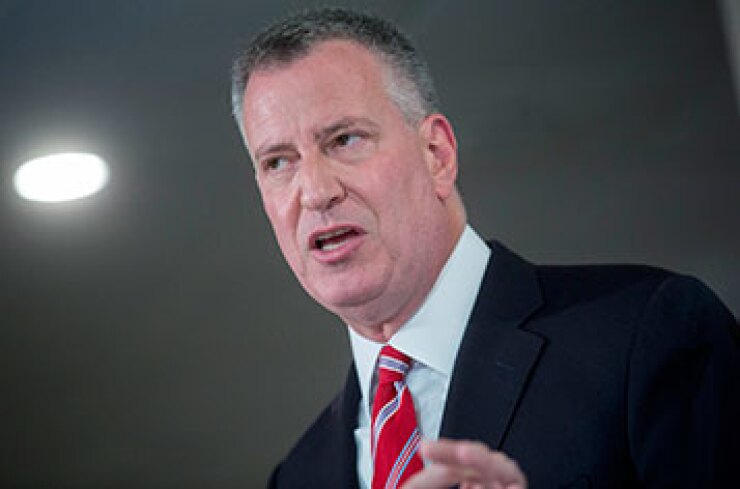A millionaire’s tax on city residents could generate up to $8 billion in bonding for mass transit in New York, Mayor Bill de Blasio said Monday.
Speaking in a packed Borough Hall rotunda in downtown Brooklyn, de Blasio announced a plan that he said could raise $700 million to $820 million annually over five years for the Metropolitan Transportation Authority, the state-run agency the operates the city’s subways and buses.
State legislative approval in Albany is necessary.

De Blasio said $500 million could modernize the subway, bus and Staten Island Railway systems and support borrowing up to $8 billion for capital upgrades.The remainder would subsidize half-fare subsidies for lower-income persons. De Blasio and the bill’s Albany sponsors, Sen. Michael Gianaris, D-Queens, and Rep. Daniel O’Donnell, D-Manhattan, insist the bill would include a lockbox provision.
The city already contributes $1.6 billion in operational support and has pledged $2.5 billion to the MTA’s five-year capital program. The MTA is a large municipal issuer with about $38 billion in debt.
The proposal would raise the city’s tax rate for the highest incomes to 4.4% from 3.9% percent on earnings above $500,000 for individuals and $1 million for families. About 32,000 people fit into that category, de Blasio told reporters.
“It’s a matter of fairness,” said the mayor, who is up for re-election this year.
Shortly after taking office in January 2014, de Blasio proposed a similar tax to fund pre-kindergarten throughout the city’s school system. Although he failed on the tax proposal, New York State funded $300 million for pre-K out of its operating budget.
That prompted reporters Monday to question whether the latest tax proposal is a bargaining chip that could result in alternate funding.
“Would I accept the state giving us a lot more money? Yes,” said de Blasio. “If someone in Albany does not want to tax the wealthy but wants to give more money to the MTA, that would still be a clear victory.”
The mayor’s ongoing feud with Gov. Andrew Cuomo is a backdrop.
“This reeks of political posturing, which is a part of the mayor’s ongoing feud with the governor,” said Anthony Figliola, vice president of Empire Government Strategies in Uniondale, N.Y. “We need our politicians to get serious and solve these tangible programs, not play to the chorus of reporters who enjoy the red meat.”
De Blasio’s plan marks the latest call for action amid the so-called summer of crisis for mass transit in the metropolitan region. Breakdowns, derailments and track fires -- all due to aging infrastructure -- have burdened commuters, prompting Gov. Andrew Cuomo to declare a state of emergency for the MTA.
Cuomo committed an additional $1 billion to the MTA’s five-year capital plan, bringing the state’s portion to $9 billion. The governor, though, provided no plan for how to use the funding.
Joseph Lhota, who returned as MTA chairman last month, recently announced an $856 million triage plan that would involve signal and track maintenance, train car reliability, safety and cleanliness and customer communications.
Lhota also called on the mayor to split $8 billion worth of long-term fixes, citing the city’s $4 billion in various reserve accounts.
Transit needs are immediate and dire, according to Lhota.
“The mayor has not acknowledged that the MTA needs funding today,” said Lhota, who lost the 2013 mayoral election to de Blasio. “You can’t delay an emergency plan to stop delays.”





